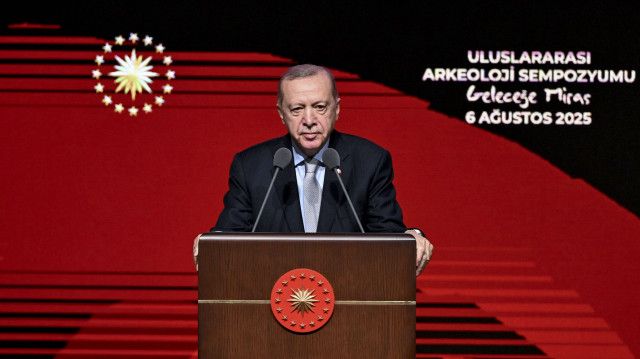President Recep Tayyip Erdoğan delivered a keynote address at the “International Archaeology Symposium and Golden Age of Archaeology Exhibition,” reaffirming Turkiye’s steadfast commitment to preserving its historical and cultural heritage.
In his speech, President Erdoğan emphasized the evolution of archaeological efforts in Turkiye, noting that the foundations laid in the early years of the Republic have gained momentum through determined action:
“Our work in archaeology has advanced significantly thanks to the resolute steps taken during the early Republican era. Today, we are carrying the torch forward by mobilizing all available resources.”
He began his remarks by offering condolences for former minister and ex-Mayor of Samsun, Mustafa Demir, expressing hope that the symposium’s discussions would yield fruitful outcomes. He extended heartfelt congratulations to all contributors and thanked those who have worked diligently behind the scenes.
Erdoğan described Anatolia as a cradle of civilizations, where faiths and cultures have intertwined to shape humanity’s collective memory:
“Anatolia is an open-air museum. Göbeklitepe in Şanlıurfa predates the Egyptian pyramids by 7,500 years. Without understanding the geography we inhabit, we cannot shape our future.”
He stressed the importance of passing Turkiyes rich archaeological legacy to future generations, recalling that efforts to preserve ancient artifacts began during the reign of Sultan Abdülmecid.
President Erdoğan praised the tireless work of archaeologists and researchers, stating that Turkiye is now a global leader in the field:
“We are writing an epic in archaeology, making unparalleled contributions to human history. From cave excavations to classical cities, the ancient past of Anatolia is being revealed.”
He announced that the number of excavation directorates across the country has surpassed 250 and highlighted the success of the “Heritage for the Future” project, which extended excavation periods from 90 days to a full year. He also noted the multidimensional nature of current research and celebrated the long-standing excavation efforts in Ephesus, which began 163 years ago.
Erdoğan introduced the concept of “nighttime museum visits,” allowing guests to experience Turkiye’s historical sites under the stars. He also celebrated the revival of Turkish-Islamic archaeology, a field that had long been sidelined.
The President highlighted major restoration projects, including the Galata Tower and Maiden’s Tower, both restored to their original grandeur. He announced that the next phase of cultural transformation would focus on Haydarpaşa and Sirkeci train stations, turning Istanbul’s Asian side into a vibrant hub for arts and heritage:
“While transportation continues at Haydarpaşa and Sirkeci, history will be brought back to life.”
Finally, Erdoğan reaffirmed Turkiye’s dedication to recovering historical artifacts that were smuggled abroad, stating that efforts to repatriate these treasures are ongoing and intense.
With record-breaking achievements in fields like librarianship and a renewed focus on cultural preservation, Turkiye is entering a golden age of archaeology—one that honors the past while building a legacy for the future

